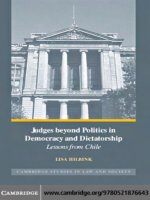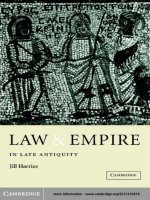0521836859 cambridge university press international legal argument in the permanent court of international justice the rise of the international judiciary feb 2005
Bạn đang xem bản rút gọn của tài liệu. Xem và tải ngay bản đầy đủ của tài liệu tại đây (3.36 MB, 539 trang )
This page intentionally left blank
International Legal Argument in the Permanent Court of
International Justice
The Rise of the International Judiciary
The International Court of Justice at The Hague is the principal
judicial organ of the United Nations, and the successor of the
Permanent Court of International Justice (1923--46), which was the
first real permanent court of justice at the international level. This
book analyses the ground-breaking contribution of the Permanent
Court to international law, in terms of both judicial technique and
the development of legal principle.
The book draws on hitherto unpublished archival material left by
judges and other persons involved in the work of the Permanent
Court, giving fascinating insights into many of its most important
decisions and the individuals who made them (Huber, Anzilotti,
Moore, Hammerskjöld and others). At the same time, it examines
international legal argument in the Permanent Court, basing its
approach on a developed model of international legal argument that
stresses the intimate relationships between international and national
lawyers and between international and national law.
O l e S p i e r m a n n is Lecturer in International Law at the University
of Copenhagen. He specialises in international law and international
dispute settlement. He is a member of the Executive Council of the
International Law Association as well as the ILA Committees on
International Commercial Arbitration and Foreign Investment. Dr
Spiermann is an associate with Jonas Bruun Law Firm, Copenhagen.
cambridge studies in international and comparative law
Established in 1946, this series produces high quality scholarship in the fields
of public and private international law and comparative law. Although these
are distinct legal sub-disciplines, developments since 1946 confirm their
interrelation.
Comparative law is increasingly used as a tool in the making of law at
national, regional and international levels. Private international law is now
often affected by international conventions, and the issues faced by classical
conflicts rules are frequently dealt with by substantive harmonisation of law
under international auspices. Mixed international arbitrations, especially those
involving state economic activity, raise mixed questions of public and private
international law, while in many fields (such as the protection of human rights
and democratic standards, investment guarantees and international criminal
law) international and national systems interact. National constitutional
arrangements relating to ‘foreign affairs’, and to the implementation of
international norms, are a focus of attention.
The Board welcomes works of a theoretical or interdisciplinary character,
and those focusing on the new approaches to international or comparative law
or conflicts of law. Studies of particular institutions or problems are equally
welcome, as are translations of the best work published in other languages.
General Editors
James Crawford SC FBA
Whewell Professor of International Law, Faculty of Law, and
Director, Lauterpacht Research Centre for International Law,
University of Cambridge
John S. Bell FBA
Professor of Law, Faculty of Law, University of Cambridge
Editorial Board
Professor
Professor
Professor
Professor
Professor
Professor
Professor
Professor
Professor
Professor
Hilary Charlesworth Australian National University
Lori Damrosch Columbia University Law School
John Dugard Universiteit Leiden
Mary-Ann Glendon Harvard Law School
Christopher Greenwood London School of Economics
David Johnston University of Edinburgh
Hein Kötz Max-Planck-Institut, Hamburg
Donald McRae University of Ottawa
Onuma Yasuaki University of Tokyo
Reinhard Zimmermann Universität Regensburg
Advisory Committee Professor D. W. Bowett QC
Judge Rosalyn Higgins QC
Professor J. A. Jolowicz QC
Professor Sir Elihu Lauterpacht CBE QC
Professor Kurt Lipstein
Judge Stephen Schwebel
A list of books in the series can be found at the end of this volume.
International Legal
Argument in the
Permanent Court of
International Justice
The Rise of the International Judiciary
Ole Spiermann
University of Copenhagen
Cambridge, New York, Melbourne, Madrid, Cape Town, Singapore, São Paulo
Cambridge University Press
The Edinburgh Building, Cambridge , UK
Published in the United States of America by Cambridge University Press, New York
www.cambridge.org
Information on this title: www.cambridge.org/9780521836852
© Ole Spiermann 2004
This book is in copyright. Subject to statutory exception and to the provision of
relevant collective licensing agreements, no reproduction of any part may take place
without the written permission of Cambridge University Press.
First published in print format 2005
-
-
---- eBook (NetLibrary)
--- eBook (NetLibrary)
-
-
---- hardback
--- hardback
Cambridge University Press has no responsibility for the persistence or accuracy of
s for external or third-party internet websites referred to in this book, and does not
guarantee that any content on such websites is, or will remain, accurate or appropriate.
The future will be ours.
B. C. J. Loder, 1920
I should like to compare our decisions to ships which are
intended to be launched on the high seas of international
criticism.
Max Huber, 1927
The drawback of an experiment, carried on on this scale, is
that it must succeed.
Åke Hammarskjöld, 1935
The Permanent Court of International Justice was the most
important link.
J. Gustavo Guerrero, 1946
Contents
Foreword
Acknowledgments
Table of cases
Table of treaties
List of abbreviations
page xiii
xv
xvii
xxx
xxxix
Part 1 The Permanent Court of International Justice
1
A project of international justice
From arbitration to adjudication
The significance of the Permanent Court
From Buchrecht to practice
3
3
14
23
Part 2 International legal argument
2
The basis of international law
Conceptions of the state
The state as a national sovereign
The state as an international law subject
The state as an international co-sovereign
The national sovereign in international legal argument
Non liquet and Article 38 of the Statute
Custom and opinio juris
Conclusions on non liquet and opinio juris
Treaty and pacta sunt servanda
A definition of state
37
37
39
40
41
57
57
62
68
71
77
3
The double structure of international legal argument
The basic structure
The national principle of self-containedness
79
79
79
vii
viii
contents
From self-containedness to the international
law of coexistence
Separating state powers
Supervening state powers: common, substantive
standards
The inherent vagueness of the international law of
coexistence
The dynamic structure
The law of treaties
Extending international law: the international law
of cooperation and conceptions of the state
Schools of treaty interpretation
The openness of the international law
of cooperation
The double structure
Recapitulation
The national principle of self-containedness in treaty
interpretation
The international law of coexistence in treaty
interpretation
Problems of international legal argument
The international community
80
83
85
88
92
92
95
98
105
106
106
109
113
114
115
Part 3 International legal argument in the Permanent
Court of International Justice
4
Revisiting the Permanent Court
Approach and material
Structure of the remaining chapters
129
129
132
5
The foundational period, 1922--1924
The Permanent Court as composed after the first
general election
The judges
The preliminary session
Outlook for the Permanent Court
The Permanent Court and advisory opinions
The International Labour Organization opinions
The Nationality Decrees opinion
The Eastern Carelia opinion
Conclusions
134
134
134
140
145
147
147
149
160
174
contents
The Wimbledon and territorial sovereignty
The case of a clear text
The dissenting opinions
The judgment
Conclusions
The basic structure of international legal argument:
four more advisory opinions
The Mavrommatis case and the Permanent Court’s
contentious jurisdiction
The test for jurisdiction
Applying the compromissory clause
Conclusions
Conclusions
6
An international lawyer’s approach,
1925--1930
President Huber
Determining the Permanent Court’s contentious
jurisdiction
The Mavrommatis case continued
The Upper Silesia case
The Mavrommatis case again
Special agreements
Conclusions
The Mosul opinion and treaty interpretation
Preliminary questions
Principles of treaty interpretation
The nature of the Council
Judge Huber’s presidency and the understanding of
sovereignty
The Lotus
The Permanent Court meets the Buchrecht
The division of the bench
The majority’s legal analysis
Conclusions
President Anzilotti and fluvial law
The aftermath of The Lotus
The Danube opinion
The River Oder case
Direct effect of treaty rules
ix
175
175
177
179
184
186
191
191
197
203
206
210
210
214
214
215
224
226
228
230
230
232
240
242
247
247
251
257
261
263
263
264
267
270
x
contents
National law and politics: new jurisdictional
questions
Introduction
Judge Hughes, the Loans cases and Judge
Fromageot
The Free Zones case, Judge Kellogg and Sir Cecil
Hurst
Conclusions
7
A national lawyer’s approach, 1931--1940
The Permanent Court as composed after the second
general election
President Adatci and other new judges
Modification of the Rules
Discontinuity
Self-restraint in treaty interpretation
The Customs Regime opinion
The Employment of Women opinion
Conclusions
Statehood, territory and sovereignty
The Free City of Danzig
The Memel Territory
The Eastern Greenland case
Conclusions
National law
President Hurst and his time
Discrimination and sovereignty
The Oscar Chinn case
The Albanian Minority Schools opinion
New judges and President Guerrero
Changes on the bench
The second Lighthouses case
The Meuse case
The Optional Clause
The Phosphates in Morocco case
The Electricity Company case
Judicial caution
Conclusions
273
273
274
284
292
300
300
300
305
308
316
316
324
330
332
332
339
344
348
348
353
364
364
367
368
368
372
373
376
376
380
382
384
contents
xi
Part 4 General conclusions
8
The legacy of the Permanent Court
International law as a complementary legal system
The national lawyer
The international lawyer
393
393
398
400
Appendix: List of Advisory Opinions, Judgments and Orders
of the Permanent Court of International Justice
Bibliography
Index
405
425
469
Foreword
From the point of view of international courts and tribunals we live in
paradoxical times. There is more activity than ever in the professional
memory of the present generation of international lawyers. Some at
least of the cases -- not only before the International Court but also
(and perhaps even more so) before the WTO Dispute Settlement Body,
the various human rights and international criminal courts and the
ad hoc tribunals and commissions -- are of considerable importance. The
cumulation of cases is developing the jurisprudence of specific areas of
international law in a rapid way. And yet there is a pervasive sense that
the whole ‘system’ is insecure, uncertain in its constitutional underpinnings, erratic in the political support for it and largely unrelated to key
issues facing the world at this time.
This being so, a study of the foundations of international decisionmaking by the first permanent international court is of renewed interest. The Permanent Court of International Justice was not seen by its
members or by governments as a prelude or an overture to something
else; it was the beginning of a distinctive and permanent institution. It
faced its own problems of the elaboration of international judicial technique and the development of the law amidst political uncertainty and a
wavering mandate. Dr Spiermann clearly identifies the focus of the work
as ‘the use of international legal argument outside the Buchrecht, that is,
in practice’. Its significance for us is enhanced given the close continuity between the Permanent Court and the International Court, not just
in terms of formal rules (the Statute of the new Court being a virtual
copy of the old) but also in terms of the practice -- the ‘received stock
of concepts’ and techniques which were not received from elsewhere
but had to be invented, the ways of handling advisory and contentious
cases that developed as a result. These emerged from the practice of the
xiii
xiv
foreword
Permanent Court. How they did so, and the tensions and disagreements
faced by the participants in the process, form the core of this splendid
book.
These days, our expectations of doctoral theses have been lowered
to fit the one size that funding bodies will allow. They are in many
cases rather apprentice works than master pieces even in the original
sense of that term. But Dr Spiermann’s work transcends the limits of
the genre, and will be of permanent value. His careful account, based
on substantial archival research and on new sources of insight, permits
an evaluation of the Permanent Court which is both balanced and positive. At the same time, practice is related to theory: the work makes a
contribution to thinking about the underpinnings of international legal
reasoning and its relation to the law we are all first taught, national law
from one or another country and the accompanying national legal traditions. For beyond the historical account of the Permanent Court there
is also a subtle theory about the ‘sources’ of international law, which
has sprung, as Dr Spiermann argues, from ‘[t]he national lawyer’s need
for international law’. The dynamic between international and national
here is thoughtfully analysed, even if we may end where we began with
a conviction that the traditions of legal thought and process intersect
and cannot be captured by dualistic categories.
Dr Spiermann is to be warmly congratulated. Hereafter the history of
the Permanent Court will not be able to be written except by reference
to this work.
James Crawford
Lauterpacht Research Centre for International Law
University of Cambridge
28 February 2004
Acknowledgments
This book is an extended and thoroughly revised version of a thesis submitted to the University of Cambridge in 1999 for the degree of Doctor
of Philosophy. It represents the outcome of years of contemplation that
began way back in 1993 in Copenhagen. The bulk of the work was carried out during my years in Cambridge, beginning in 1995 when I was
enrolled in the LLM programme in international law. I stayed on for
another three years as a doctorate student in that unique atmosphere
of international legal research that I had come to identify with, first of
all, Professor James Crawford and Professor Philip Allott.
Professor Crawford was the supervisor of my LLM thesis, ‘Mrs Butterfingers’ Essay on Sovereignty’. He continued as my supervisor for
the first two years of my PhD research, and he also kindly helped me
in the last intense weeks before submission of the thesis, and again
before submission of this manuscript. His broadmindedness, efficiency
and general interest in legal research provided an exceptional atmosphere in which to explore new ideas. In my last year of research, when
Professor Crawford was on sabbatical, Professor Vaughan Lowe took over
the supervision of my research. Professor Lowe introduced me to the welcome, though onerous, concept of archival research, which soon took
me around Europe and to the United States. I have consistently been
aware of what a privilege it has been to have such excellent scholars to
guide me. I give them my warmest thanks.
I also thank my examiners, Professor Philip Allott and Professor
John G. Merrills, for valuable criticism. The viva took place in the
same rooms in Trinity College, Cambridge in which I had originally
discussed the prospects of a doctorate with Professor Allott. I also wish
to thank Professor Martti Koskenniemi, who read the revised manuscript
of this book and provided me with much appreciated comments.
xv
xvi
acknowledgements
Professor Koskenniemi’s From Apology to Utopia has served as a source
of inspiration since the very beginning of my research in international
law. Thanks also to my parents and sister and to Mrs Ciara Damgaard,
Mr Knut Hammarskjöld, Ms Joanna Harrington, Dr Ulrich Huber,
Mr Thomas Holst Laursen, Mr Amnon Lev, Mr Per Magid and Miss Anna
Stamhus Nielsen, and to Ms Finola O’Sullivan, Dr Alison Powell, Mr
Martin Gleeson and all at the Press who have brilliantly carried out
the publication of this book.
It is with happiness that I reminisce on my visits to the Archives du
Ministère des Affaires Etrangères at the Quai d’Orsay, the Bundesarchiv
in Koblenz, the Harvard Law School Library in the ‘other’ Cambridge,
the Kungliga biblioteket in Stockholm, the Library of Congress in
Washington DC, the Nationaalarchief in The Hague, the National
Archives and Records Administration in Maryland, the Peace Palace
Library in The Hague, the Public Record Office in London, the Rigsarkivet
in Copenhagen, the Universitäts- und Landesbibliothek Münster and the
Zentralbibliothek in Zurich. Thanks also to the staffs at the League of
Nations Archives in Geneva, the Squire Law Library in Cambridge, the
Yale University Library in New Haven, the Memorial Hall of the M. Adachi
Foundation in Kyoto and the Minnesota Historical Society in St Paul.
The Danish Research Academy generously funded my PhD research.
I am pleased also to record my thanks to the British Council, which
contributed towards the costs of my LLM year, and to the Anglo-Danish
Society, the University of Copenhagen, Jesus College, Cambridge and
the Axel H’s Rejselegat. I also thank the Augustinus Fonden, the Axel H’s
Rejselegat, the Davids Samling, the Margot og Thorvald Dreyers Fond, the
Finneske Legat, the Gangstedfonden and the Knud Højgaards Fond for
providing generous funding towards the costs of archival research and
other expenses incurred while revising the manuscript at the University
of Copenhagen.
The present work is dedicated to Karina, who I thank last and most.
Copenhagen
1 October 2003
Table of cases
Aaland Islands Case, Official Journal 1920, Special Supplement
No. 3 (1920), 151, 164, 361
Aaland Islands Case (Second Phase), Document du Conseil B7,
21/68/106 (1921), 164
Access to German Minority Schools in Polish Upper Silesia, PCIJ Series
A/B No. 40 (1931), 229, 323
Access to, or Anchorage in, the Port of Danzig of Polish War Vessels, PCIJ
Series A/B No. 43 (1931), 330, 334, 335
Acquisition of Nationality, see Questions concerning the Acquisition of
Polish Nationality
Admission of a State to the United Nations (Charter, Art.4), ICJ Reports
[1947--8] 57, 98, 137, 395
Aegean Sea Continental Shelf, ICJ Reports [1978] 3, 83, 94, 103, 156
Aerial Incident of 10 August 1999, ICJ Reports [2000] 12, 103
Affaire de l’île de Timor, 11 RIAA 490 (1914), 74
Affaire des biens britanniques au Maroc espagnol, 2 RIAA 615 (1924), 87,
151, 155, 197, 202, 204--5, 229, 255, 272
Affaire des chemins de fer Zeltweg-Wolfsberg et Unterdrauburg-Woellan,
3 RIAA 1795 (1934), 358
Affaire des réparations allemandes selon l’article 260 du Traité de
Versailles, 1 RIAA 429 (1924), 190, 199, 233
Affaire des zones franches, 3 RIAA 1455 (1933), 292
Affaire relative à la concession des phares de l’empire ottoman, 12 RIAA
155 (1956), 373--5
Affaire relative à l’acquisition de la nationalité polonaise, 1 RIAA 401
(1924), 187
AGIP v. Congo, 1 ICSID Reports 306 (1979), 79
xvii
xviii
table of cases
Al-Adsani v. United Kingdom, ECHR Reports 2001-XI, 125
Albanian Minority Schools, see Minority Schools in Albania
Aloeboetoe et al. v. Suriname (Compensation), 116 ILR 260 (1993), 86
Ambatielos Case (Merits), ICJ Reports [1953] 10, 197
Amco Asia Corporation and Others v. Indonesia (Jurisdiction), 1 ICSID
Reports 389 (1983), 115
Amco Asia Corporation and Others v. Indonesia (Resubmitted Case)
(Jurisdiction), 1 ICSID Reports 543 (1988), 223
Anglo-Iranian Oil Co. Case (Jurisdiction), ICJ Reports [1952] 93, 79,
103, 137
Appeal from a Judgment of the Hungary-Czechoslovak Mixed Arbitral
Tribunal (the Peter Pázmány University v. the State of
Czechoslovakia), PCIJ Series A/B No. 61 (1933), 349, 353--4
Appeals from certain Judgments of the Hungary-Czechoslovak Mixed
Arbitral Tribunal, PCIJ Series A/B No. 56 (1933), 357
Applicability of the Obligation to Arbitrate under Section 21 of the
United Nations Headquarters Agreement of 26 June 1947, ICJ
Reports [1988] 12, 172
Application for Review of Judgment No. 158 of the United Nations
Administrative Tribunal, ICJ Reports [1973] 166, 112, 172
Application for Review of Judgment No. 273 of the United Nations
Administrative Tribunal, ICJ Reports [1982] 325, 172
Application of the Convention on the Prevention and Punishment of the
Crime of Genocide (Preliminary Objections), ICJ Reports [1996]
595, 124
Article 3, Paragraph 2, of the Treaty of Lausanne (Frontier between
Turkey and Iraq), PCIJ Series B No. 12 (1925), 4, 189, 230--42,
266, 293, 297
Asian Agricultural Products Limited v. Sri Lanka, 4 ICSID Reports 246
(1990), 99
Barcelona Traction, Light and Power Company Limited (Merits), ICJ
Reports [1970] 3, 54, 79, 85, 86, 122, 124, 125, 153, 384
Borchgrave Case (Preliminary Objections), PCIJ Series A/B No. 72
(1937), 329, 359, 371
Border and Transborder Armed Actions (Jurisdiction and Admissibility),
ICJ Reports [1988] 69, 76, 220
Brazilian Loans, see Case concerning the Payment in Gold of Brazilian
Federal Loans contracted in France
Brown v. United Kingdom, 6 RIAA 120 (1923), 358
Case concerning Avena and other Mexican Nationals, ICJ Reports
[2004] (not yet reported) (31 March 2004), 84
table of cases
Case concerning Certain German Interests in Polish Upper Silesia
(Jurisdiction), PCIJ Series A No. 6 (1925), 192, 195, 196, 206,
215--24, 277--8, 359, 382
Case concerning Certain German Interests in Polish Upper Silesia
(Merits), PCIJ Series A No. 7 (1926), 25, 76, 187, 188, 213,
215--24, 224, 277--8, 279, 291, 297, 333, 353, 361, 399
Case concerning Maritime Delimitation and Territorial Questions
between Qatar and Bahrain (Merits), ICJ Reports [2001] 40, 4, 345
Case concerning Right of Passage over Indian Territory (Merits), ICJ
Reports [1960] 6, 94, 104, 253, 381
Case concerning Rights of Nationals of the United States of America in
Morocco, ICJ Reports [1952] 176, 74, 294
Case concerning the Administration of the Prince von Pless
(Jurisdiction), PCIJ Series A/B N0. 52 (1933), 358, 382, 384
Case concerning the Administration of the Prince von Pless, PCIJ Series
A/B No. 59 (1933), 357, 381, 384
Case concerning the Aerial Accident of July 27th, 1955 (Preliminary
Objections), ICJ Reports [1959] 127, 12, 220
Case concerning the Arrest Warrant of 11 April 2000, ICJ Reports
[2002] 3, 30, 84, 96, 121, 257
Case concerning the Delimitation of the Territorial Waters between the
Island of Castellorizo and the Coasts of Anatolia, PCIJ Series A/B
No. 51 (1933), 357
Case concerning the Factory at Chorzów (Claim for Indemnity)
(Interim Measure of Protection), PCIJ Series A No. 12
(1927), 21, 236
Case concerning the Factory at Chorzów (Claim for Indemnity)
(Jurisdiction), PCIJ Series A No. 9 (1927), 21, 87, 219, 221,
224, 225, 226, 228, 229, 271
Case concerning the Factory at Chorzów (Claim for Indemnity)
(Merits), PCIJ Series A. No 17 (1928), 21, 87, 217, 219, 221,
228, 278, 331
Case concerning the Legal Status of the South-Eastern Territory of
Greenland, PCIJ Series A/B No. 48 (1932), 11, 346, 382
Case concerning the Northern Cameroons (Preliminary Objections),
ICJ Reports [1963] 15, 172
Case concerning the Payment in Gold of Brazilian Federal Loans
contracted in France, PCIJ Series A. No 21 (1929), 258, 276,
277, 280, 282
Case concerning the Payment of Various Serbian Loans issued in France,
PCIJ Series A No. 20 (1929), 92, 276, 277, 279--84, 297
xix
xx
table of cases
Case concerning the Polish Agrarian Reform and the German Minority,
PCIJ Series A/B No. 60 (1933), 357
Case concerning the Temple of Preah Vihear (Merits), ICJ Reports
[1962] 6, 83
Case of Certain Norwegian Loans, ICJ Reports [1957] 9, 103, 156
Case of the Free Zones of Upper Savoy and the District of Gex (First
Phase), PCIJ Series A No. 22 (1929), 20, 88, 276, 284--92, 297,
298, 318, 401
Case of the Free Zones of Upper Savoy and the District of Gex (Second
Phase), PCIJ Series A No. 24 (1930), 76, 114, 172, 284--92,
297, 298, 318, 361, 401
Case of the Free Zones of Upper Savoy and the District of Gex (Third
Phase), PCIJ Series A/B No. 46 (1932), 76, 114, 224, 258,
284--92, 297, 298, 318, 346, 366, 401
Case of the Mavrommatis Palestine Concessions (Jurisdiction), PCJI
Series A No.2 (1924), 20, 21, 85, 175, 184, 187, 190, 191--206,
209, 215, 218, 225, 233, 359, 377, 382, 384, 399
Case of the Monetary Gold removed from Rome in 1943, ICJ Reports
[1954] 19, 88
Case of the Readaptation of the Mavrommatis Jerusalem Concessions
(Jurisdiction), PCIJ Series A No. 11 (1927), 224--5
Case of the SS Lotus, PCIJ Series A. No. 10 (1927), 21, 30, 31, 32,
83, 97, 133, 180, 242, 247--63, 266, 267, 291, 293, 297, 298,
344, 346, 347, 388, 399, 402
Case of the SS Wimbledon, PCIJ Series A No. 1 (1923), 73, 175--86,
188, 189, 208, 209, 241, 243, 244, 291, 292, 303, 304, 328, 361
Case relating to Certain Aspects of the Laws on the Use of Languages in
Education in Belgium (Merits), ECHR Series A No. 6 (1968), 110
Case relating to Certain Aspects of the Laws on the Use of Languages in
Education in Belgium (Preliminary Objections), ECHR Series A
No. 5 (1966), 197
Case relating to the Territorial Jurisdiction of the International
Commission of the River Oder, PCIJ Series A No. 23 (1929), 254,
258, 265--6, 267--70, 276, 297, 373, 374, 399, 401
Certain Expenses of the United Nations (Article 17, Paragraph 2, of the
Charter), ICJ Reports [1962] 151, 158, 171, 172
Ceskoslovenska Obchodni Banka, AS v. Slovakia (Jurisdiction), 5 ICSID
Reports 335 (1999), 115
Cession of Vessels and Tugs for Navigation on the Danube, 1 RIAA 97
(1921), 180
table of cases
Chorzow Factory, see Case concerning the Factory at Chorzów (Claim
for Indemnity); Interpretation of Judgments Nos. 7 & 8 (the
Chorzów Factory)
Collino and Chiappero v. Telecom Italia SpA, Case C-343-/98, [2000]
ECR 1--6659, 272
Colombian-Peruvian Asylum Case, ICJ Reports [1950] 266, 84, 94, 137
Communities, see Interpretation of the Convention between Greece and
Bulgaria respecting Reciprocal Emigration
Compania de Aguas del Aconquija, SA and Vivendi Universal
(Compagnie Générale des Eaux) v. Argentina (Annulment), 6
ICSID Reports 340 (2002), 27
Competence of the Assembly regarding Admission to the United Nations,
ICJ Reports [1950] 4, 137
Competence of the International Labour Organisation, see International
Labour Organisation and the Conditions of Agricultural Labour
Competence of the International Labour Organisation to Regulate,
Incidentally, the Personal Work of the Employer, PCIJ Series B
No. 13 (1926), 242, 244--5, 246, 296
Consistency of certain Danzig Legislative Decrees with the Constitution of
the Free City, PCIJ Series A/B No. 65 (1935), 165, 167, 332,
350, 357, 360
Constitution of the Maritime Safety Committee of the Inter-Governmental
Maritime Consultative Organisation, ICJ Reports [1960] 150, 172
Continental Shelf (Libya v. Malta) ICJ Reports [1985] 13, 21, 56
Continental Shelf (Libya v. Malta) (Intervention), ICJ Reports [1984]
3, 21, 88
Continental Shelf (Tunisia v. Libya), ICJ Reports [1982] 18, 21, 375
Corfu Channel Case (Merits), ICJ Reports [1949] 4, 81, 83, 87, 137, 245
Corfu Channel Case (Preliminary Objections), ICJ Reports [1947--8]
15, 228
Costa v. ENEL, Case 6/64, [1964] ECR 585, 52
Customs Regime between Germany and Austria (Protocol of March 19th,
1931), PCIJ Series A/B No. 41 (1931), 18, 19, 32, 167, 197, 244,
290, 314, 315, 316--24, 330, 357, 361, 386, 400, 401
Danube, see Jurisdiction of the European Commission of the Danube
between Galataz and Braila
Danzig and the International Labour Organisation, see Free City of
Danzig and International Labour Organisation
Delimitation of the Maritime Boundary in the Gulf of Maine Area, ICJ
Reports [1984] 246, 48, 55, 56
xxi
xxii
table of cases
Distomo Massacre Case, (2003) 42 ILM 1030 (2003), 86
Diversion of Water from the Meuse, PCIJ Series A/B No. 70 (1937),
373--5, 399
Draft Agreement relating to the Creation of the European Economic
Area, Opinion 1/91, [1991] ECR I-6079, 52
Dubai-Sharjah Border Arbitration, 91 ILR 543 (1981), 4
East Timor, ICJ Reports [1995] 90
Eastern Carelia, see Status of Eastern Carelia
Eastern Extension, Australian & China Telegraph Co. Limited v. United
States, 6 RIAA 112 (1923), 90
Eastern Greenland, see Legal Status of Eastern Greenland
Effect of Awards of Compensation made by the United Nations
Administrative Tribunal, ICJ Reports [1954] 47, 137
El Corte Inglés SA v. Blásquez Rivero, Case C-192/94, [1996] ECR
I-1281, 272
Electricity Company of Sofia and Bulgaria (Attendance), PCIJ Series
A/B No. 80 (1940), 384
Electricity Company of Sofia and Bulgaria (Interim Measures of
Protection), PCIJ Series A/B No. 79 (1939), 20, 384
Electricity Company of Sofia and Bulgaria (Preliminary Objections)
PCIJ Series A/B N0. 77 (1939), 11, 292, 329, 358, 359, 379,
380--2, 383, 384
Electronica Sicula SpA, ICJ Reports [1989] 15, 70
Employment of Women, see Interpretation of the Convention of 1919
concerning Employment of Women during the Night
European Communities: Measures concerning Meat and Meat Products
(Hormones), [1998] DSR 135, 111
Exchange of Greek and Turkish Populations, PCIJ Series B No. 10
(1925), 71, 188, 211, 233, 242--4, 246, 374
Faccini Dori v. Recreb, Case C-91/92, [1994] ECR I-3325, 272
Fisheries, ICJ Reports [1951] 116, 21, 137
Fisheries Jurisdiction (Spain v. Canada), ICJ Reports [1998] 432, 103,
104, 204
Fisheries Jurisdiction (United Kingdom v. Iceland), ICJ Reports
[1974] 3, 84, 253, 375
Free City of Danzig and International Labour Organisation, PCIJ Series
B No. 18 (1930), 94, 167, 237, 264, 273, 312, 333, 361
Free Zones, see Case of the Free Zones of Upper Savoy and the District of Gex
Frontier Dispute (Burkina Faso v. Mali), ICJ Reports [1986] 554, 73, 83
Gabcikovo-Nagymaros Project, ICJ Reports [1997] 7, 72, 87, 375
table of cases
German Settlers, see Questions relating to Settlers of German Origin in
Poland
Goetz and Others v. Burundi, 6 ICSID Reports 5 (1998), 181
Greco-Turkish Agreement, see Interpretation of the Greco-Turkish
Agreement of December 1st, 1926 (Final Protocol, Article IV)
Gulf of Fonseca (El Salvador v. Nicaragua), 11 American Journal of
International Law 674 (1917), 84
Handyside v. United Kingdom, ECHR Series A No. 24 (1976), 110
Hartford Fire Insurance Co. and Others v. California and Others, 100
ILR 566 (1993), 92
Haya de la Torre Case, ICJ Reports [1951] 71, 61
Hilton v. Guyot, 159 US 113 (1895), 58
Interhandel Case ICJ Reports [1959] 6, 156
International Labour Organisation and the Conditions of Agricultural
Labour, PCIJ Series B No. 2 (1922), 148, 182, 198, 233, 246,
296
International Labour Organisation and the Methods of Agricultural
Production, PCIJ Series B No. 3 (1922), 148, 245, 296
International Status of South-West Africa, ICJ Reports [1950] 128, 137
Interpretation of Judgment No. 3 (Interpretation of Paragraph 4 of the
Annex following Article 179 of the Treaty of Neuilly), PCIJ Series A
No. 4 (1925), 222, 226, 227
Interpretation of Judgments Nos. 7 and 8 (the Chorzów Factory), PCIJ
Series A. No. 13 (1927), 21, 194, 222, 249, 278, 399
Interpretation of Paragraph 4 of the Annex following Article 179 of the
Treaty of Neuilly, PCIJ Series A. No. 3 (1924), 222, 226, 227
Interpretation of Peace Treaties, ICJ Reports [1950] 65, 88, 171, 231
Interpretation of Peace Treaties (Second Phase), ICJ Reports
[1950] 221, 386
Interpretation of the Agreement of 25 March 1951 between the WHO and
Egypt, ICJ Reports [1980] 73, 118
Interpretation of the Convention between Greece and Bulgaria respecting
Reciprocal Emigration, signed at Neuilly-sur-Seine on November
27th, 1919 (Question of the ‘Communities’), PCIJ Series B No. 17
(1930), 274
Interpretation of the Convention of 1919 concerning Employment of
Women during the Night, PCIJ Series A/B No. 50 (1932), 324--30
Interpretation of the Greco-Bulgarian Agreement of December 9th, 1927
(Caphandaris-Molloff Agreement), PCIJ Series A/B No. 45 (1932),
278, 331
xxiii









